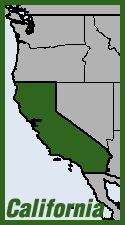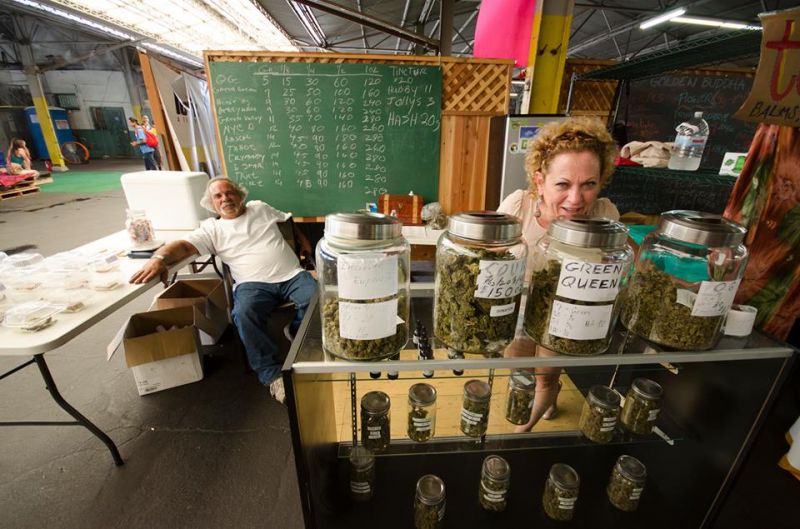 California's Eureka Times-Standard reported July 27 that a two-week multi-agency operation eradicated some 55,000 cannabis plants on and around the Yurok Indian reservation. The Yurok Tribe carried out similar raids last year, eradicating 15,000 plants, and intends to go on doing so every summer until growers leave the area, Yurok vice-chair Susan Masten said. "We're not going to quit until there are zero plants growing on the reservation," she told the Times-Standard. Authorities also seized 1,000 pounds of processed cannabis, made seven arrests, served 30 search warrants, discovered one butane hash oil lab, and allegedly found (unnamed) evidence indicating the possibility of Mexican cartel involvement in some of the grows. Along with tribal police, the Humboldt County Drug Task Force, California Department of Fish & Wildlife, National Guard, and California Department of Forestry participated in "Operation Yurok."
California's Eureka Times-Standard reported July 27 that a two-week multi-agency operation eradicated some 55,000 cannabis plants on and around the Yurok Indian reservation. The Yurok Tribe carried out similar raids last year, eradicating 15,000 plants, and intends to go on doing so every summer until growers leave the area, Yurok vice-chair Susan Masten said. "We're not going to quit until there are zero plants growing on the reservation," she told the Times-Standard. Authorities also seized 1,000 pounds of processed cannabis, made seven arrests, served 30 search warrants, discovered one butane hash oil lab, and allegedly found (unnamed) evidence indicating the possibility of Mexican cartel involvement in some of the grows. Along with tribal police, the Humboldt County Drug Task Force, California Department of Fish & Wildlife, National Guard, and California Department of Forestry participated in "Operation Yurok."

 Tribal authorities in Northern California are reacting angrily to a July 8 raid on two cannabis grows in Modoc County. The operations were owned by the
Tribal authorities in Northern California are reacting angrily to a July 8 raid on two cannabis grows in Modoc County. The operations were owned by the  Los Angeles' first-ever marijuana farmers market was
Los Angeles' first-ever marijuana farmers market was  The US Supreme Court ruled 5-4 on April 22 in Navarette v. California that a traffic stop that led to a marijuana arrest was constitutional because police had reasonable suspicion the driver was intoxicated. In 2008, California Highway Patrol officers stopped Lorenzo Prado Navarette's pickup truck on a Mendocino County road based on a 911 tip about reckless driving. The officers said they smelled marijuana when approaching the vehicle. They conducted a search and found 30 pounds of cannabis. Navarette and a passenger were arrested and charged. At trial, they moved to suppress the evidence on grounds that the search violated their Fourth Amendment rights because the officers lacked reasonable suspicion when they pulled Navarette over. But in the opinion authored by conservative Justice Clarence Thomas, the majority found that while an anonymous tip will not always lead to reasonable suspicion, in this case it did. The court found that "under appropriate circumstances, an anonymous tip can demonstrate sufficient indicia of reliability to provide reasonable suspicion to make an investigatory stop." Conservative Justice Antonin Scalia wrote a dissent that was joined by the court's liberals, Ruth Bader Ginsburg, Sonia Sotomayor and Elena Kagan. Conservatives John Roberts and Samuel Alito lined up with the majority, as did swing voters Stephen Breyer and Anthony Kennedy. (
The US Supreme Court ruled 5-4 on April 22 in Navarette v. California that a traffic stop that led to a marijuana arrest was constitutional because police had reasonable suspicion the driver was intoxicated. In 2008, California Highway Patrol officers stopped Lorenzo Prado Navarette's pickup truck on a Mendocino County road based on a 911 tip about reckless driving. The officers said they smelled marijuana when approaching the vehicle. They conducted a search and found 30 pounds of cannabis. Navarette and a passenger were arrested and charged. At trial, they moved to suppress the evidence on grounds that the search violated their Fourth Amendment rights because the officers lacked reasonable suspicion when they pulled Navarette over. But in the opinion authored by conservative Justice Clarence Thomas, the majority found that while an anonymous tip will not always lead to reasonable suspicion, in this case it did. The court found that "under appropriate circumstances, an anonymous tip can demonstrate sufficient indicia of reliability to provide reasonable suspicion to make an investigatory stop." Conservative Justice Antonin Scalia wrote a dissent that was joined by the court's liberals, Ruth Bader Ginsburg, Sonia Sotomayor and Elena Kagan. Conservatives John Roberts and Samuel Alito lined up with the majority, as did swing voters Stephen Breyer and Anthony Kennedy. (





Recent comments
1 week 6 days ago
2 weeks 6 days ago
6 weeks 6 days ago
10 weeks 4 days ago
14 weeks 5 days ago
15 weeks 3 days ago
25 weeks 3 days ago
29 weeks 3 days ago
30 weeks 4 days ago
30 weeks 4 days ago